Pam Spaulding's Blog, page 9
July 23, 2011
What Genital Reconstruction Surgery, And When
There are women of color and there are disabled women; there are lesbians and there are women of faith; there are mothers and there are servicewomen; there are women veterans and bisexual women -- and that's hardly an exhaustive list of the subcategories of women. Women's experience intersects with multiple labels and multiple identities; each woman's experience is complex, and not solely described within the confines of the "female" and "woman" found within western society's binary sex and gender norms.
In the past handful of years, I've come to understand that the trans in the phrase "trans woman" is descriptor for a kind of women in the same way that "disabled" and "African-American" are descriptors of kinds of women in the phrases "disabled woman" and "African-American woman."
And I am a trans woman. As a trans woman -- as a transsexual -- I've been taking hormones and androgen blockers for over 8-years as appropriate treatment for my medical condition. This is in accordance with the Harry Benjamin Standards Of Care (HBSOC).
Well, I'm going in for one of the genital reconstruction surgeries for transsexuals; I'm heading up to Lake Oswego, Oregon for a bilateral orchiectomy. (In the trans world, a bilateral orchiectomy is often simply referred to as an "orchi.") For male-to-female transsexuals, a bilateral orchidectomy is a form of genital reconstruction surgery that's less invasive surgery than a vaginoplasty. But unlike a vaginoplasty, a bilateral orchiectomy doesn't construct a vaginal canal and its mucous membrane.
I know that for most men I know, the idea of any form of genital reconstruction surgery for themselves is a cringe moment. I'm not a man though, and an orchidectomy will be a relief for me. In having the surgery I'll not only remove the primary source of testosterone and other androgens in my body, but it'll also allow me to change my California birth certificate to state that I'm female. From there, all of my identifications -- from my Social Security records to my Department of Defense retirement pay records -- will be able to be changed from male to female.
Since I socially began transition in February of 2003, I embraced the idea that one shouldn't transition any more than one needs to be comfortable within one's own skin. Frankly, I'm no longer comfortable in my own skin -- especially from that documentation perspective. I want goverment to recognize me as female.
For me, I have personal concerns about having a vaginoplasty. For one, a vaginoplasty is an invasive, serious bit of surgery. It took me about two years to fully recover from my gastric bypass in February of 2008, so I'm a bit concerned about how I would experience recovery from a vaginoplasty.
And then there's always that reality of when a trans woman has a vaginoplasty, she's trading her low maintenance genitalia for higher maintenance genitalia. For those who aren't aware, a vaginoplasty requires a considerable amount of maintenance in the first year after surgery in the form of vaginal dilation multiple times a day.
I'm concerned about the higher maintenance aspect of a vaginoplasty due to my bipolar condition; my bipolar condition is the main factor in my decision making process on which surgery I'm opting for.
Basically, I'm already not always compliant with my medication and treatment regimens for all of my health conditions -- not because I'm intentionally incompliant, but because when I feel the effects of bipolar depression or hypomania, I sometimes become forgetful; I sometimes lose track of time; I sometimes loose my ability to focus for significant periods of time. Although I'm sure I'd be compliant with the dilation regimen for the first few months after surgery, I'm not confident that I'd follow through with dilation as frequently as I should due to how far my bipolar condition has progressed in the past few years.
If I'd have had a vaginoplasty five or six years ago, during a time I couldn't have afforded a vaginoplasty...well, my bipolar condition was not as progressed as it is now. It seems to me that a few years ago I'd have likely been able to be compliant regarding dilation regimen during that first year after surgery, as compared to now when I have to question whether I'd be able to be fully compliant.
So even though it is less expensive to have an orchi than it is to have a vaginoplasty, that's actually not why I'm having an orchi. It's those other considerations -- especially my bipolar condition -- that are guiding my decision on which genital reconstruction surgery I'm going to have.
My surgery is scheduled for August 17th, and it's going to be accomplished by Dr. Tuan Nguyen. One of the two letters from mental health professionals required for the surgery per the HBSOC has already been submitted to Dr. Nguyen; the second letter should be sent from my second mental health professional in by early this coming week. I've already paid for the surgery and arranged transportation up to Lake Oswego -- all there's really left to do is arrange for a hotel room for the couple of nights I'll be there in Oregon.
There are women of color and there are disabled women; there are lesbians and there are women of faith; there are mothers and there are servicewomen; there are women veterans and bisexual women -- I'm a disabled woman, a woman veteran, and I'm a trans woman.
Where I'll be and what I'll be doing on August 17th has to do with me being a trans woman. It should be an interesting day, for sure.
Let's all play the NOM drinking game
crossposted on Holy Bullies and Headless Monsters
In tribute to all of the gay and lesbian couples getting married in New York this weekend, let's all play this fun game:
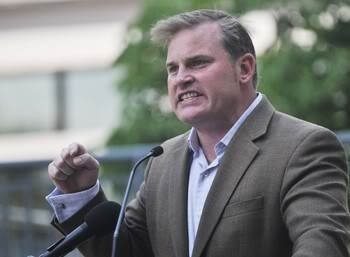 We all must recognize just how the National Organization for Marriage uses empty and repetitive talking points against marriage equality.
We all must recognize just how the National Organization for Marriage uses empty and repetitive talking points against marriage equality.
But let's also have a little fun with it. From various press conferences and interviews, I have gleaned a little drinking game which can be played whenever an interview is conducted NOM's Maggie Gallagher or Brian Brown, or when the organization holds a press conference. It's a minor drinking game - goodness knows that NOM has probably caused enough lgbtqs to drink as it is - so bear with me and feel free to add more categories (but no being mean).
Enjoy
1 Drink
When Maggie Gallagher interrupts the interviewer or the person she is debating
When either Gallagher or Brian Brown claim that marriage has meant the same things to all civilizations throughout history.
When Maggie Gallagher wears red.
When the phrase "marriage is unique and special" is used. Or when the statement "only marriage can connect parents with children" is used.
When the phrases or words "redefine marriage, "profound consequences," or "Massachusetts" are mentioned.
When either Gallagher or Brown introduces the word "bigot" into the conversation.
When there is one African-American or Hispanic participant at a NOM press conference.
2 Drinks
Gallagher uses "jazz hands" to illustrate her point
Brown or Gallagher talks about children being "taught" homosexuality
When Brown or Gallagher sidesteps any questions asking them about same-sex households, particularly same-sex households with children.
When there are two or more African-American or Hispanic participants at a NOM press conference
When an anecdote about "religious persecution" because of marriage equality is brought up by Gallagher or Brown without any other information as to the truth of said anecdote.
When Gallagher refers to the work of "legal scholars" without mentioning that said "legal scholars" are affiliated with either NOM or the Catholic Church.
When it is mentioned that the "overwhelming majority of Americans in over 30 states voted against marriage equality."
3 Drinks
Whenever Gallagher, Brown, or anyone else mentions how marriage is the "uniting of the two great halves of humanity."
Related posts:
NOM's Brian Brown vs. Rev. Al Sharpton - it's not even a contest
NOM astroturfed 'legal scholars' in New York
The Point Foundation honors its scholars past and present

 I'm in Chicago to serve on a panel on blogging and activism at the Point Foundation's Leadership Conference, and last night the organization held its gala at the Field Museum (right) celebrating its 10th anniversary, the first with all past and present Scholars in attendance.
I'm in Chicago to serve on a panel on blogging and activism at the Point Foundation's Leadership Conference, and last night the organization held its gala at the Field Museum (right) celebrating its 10th anniversary, the first with all past and present Scholars in attendance.The foundation offers academic scholarships to gay, lesbian, bisexual and transgender college students who have been marginalized because of their sexual orientation/gender identity and expression. In addition, these future leaders are given leadership training, and opportunities to network and grow professionally in ways they would not have. And we heard from many of them last night.
 Hosted by out gay MSNBC anchor and journalist Thomas Roberts, attendees heard moving personal stories of success and opportunity from past Point scholars, and met this year's class of meritorious students. The alumni also took the initiative to pay it forward, presenting a check to the Point Foundation for $25K to ensure that future scholars receive the same kind of generous support - financial, emotional, anda mentoring support -- down the road.
Hosted by out gay MSNBC anchor and journalist Thomas Roberts, attendees heard moving personal stories of success and opportunity from past Point scholars, and met this year's class of meritorious students. The alumni also took the initiative to pay it forward, presenting a check to the Point Foundation for $25K to ensure that future scholars receive the same kind of generous support - financial, emotional, anda mentoring support -- down the road.  The keynote address was given by actress, activist, and long-time LGBT advocate Judith Light, who delivered an emotional address, quoting her friend, the late writer Paul Monette, and describing her decades of support as a personal commitment-- from the height of the AIDS crisis through today's ongoing successes and challenges to achieve full equality.
The keynote address was given by actress, activist, and long-time LGBT advocate Judith Light, who delivered an emotional address, quoting her friend, the late writer Paul Monette, and describing her decades of support as a personal commitment-- from the height of the AIDS crisis through today's ongoing successes and challenges to achieve full equality.You can join in and donate to Point here. Some photos from the event:

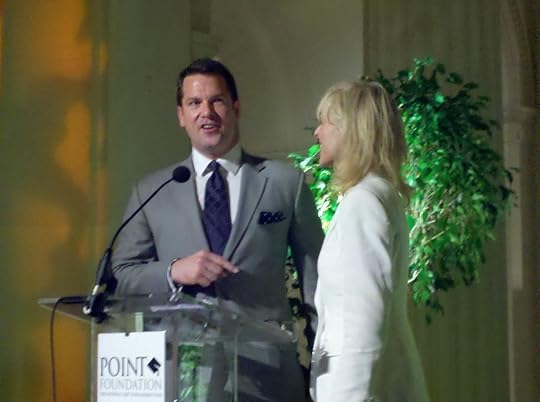
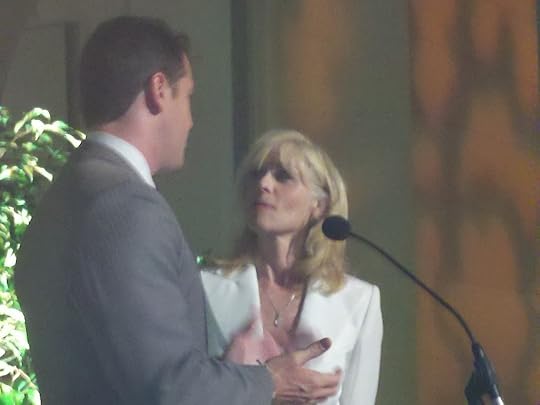
And I was finally able to meet Katie Miller. You might recall the former West Point cadet was one of the people on the front lines of the fight to repeal DADT, and participated in a liveblog at the Blend. She is also one of the Point Scholars. Congrats, Katie.
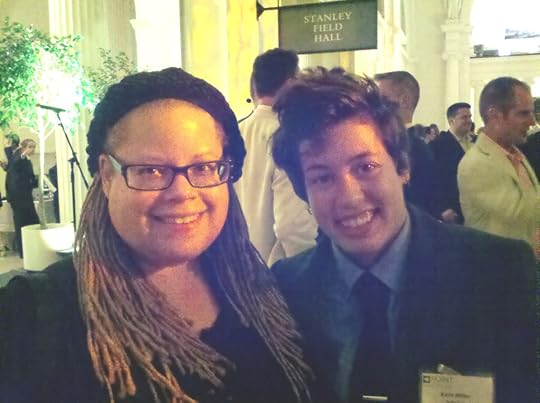
And I got a pic with Judith Light (of course my fave role of hers is the hard-as-nails Judge Elizabeth Donnelly on L&O: SVU). Thank you for being such an ally.

As I post this, blogger Andy Towle is on his way; he will serve on the panel with me today (Sat). That is, of course, if weather at O'Hare cooperates. We've had some serious storms here.
July 22, 2011
The President Certifies Repeal of Don't Ask, Don't Tell
Statement by the President on Certification of Repeal of Don't Ask, Don't Tell
Today, we have taken the final major step toward ending the discriminatory ‘Don’t Ask, Don’t Tell’ law that undermines our military readiness and violates American principles of fairness and equality. In accordance with the legislation that I signed into law last December, I have certified and notified Congress that the requirements for repeal have been met. ‘Don’t Ask, Don’t Tell’ will end, once and for all, in 60 days—on September 20, 2011.
As Commander in Chief, I have always been confident that our dedicated men and women in uniform would transition to a new policy in an orderly manner that preserves unit cohesion, recruitment, retention and military effectiveness. Today’s action follows extensive training of our military personnel and certification by Secretary Panetta and Admiral Mullen that our military is ready for repeal. As of September 20th, service members will no longer be forced to hide who they are in order to serve our country. Our military will no longer be deprived of the talents and skills of patriotic Americans just because they happen to be gay or lesbian.
I want to commend our civilian and military leadership for moving forward in the careful and deliberate manner that this change requires, especially with our nation at war. I want to thank all our men and women in uniform, including those who are gay or lesbian, for their professionalism and patriotism during this transition. Every American can be proud that our extraordinary troops and their families, like earlier generations that have adapted to other changes, will only grow stronger and remain the best fighting force in the world and a reflection of the values of justice and equality that the define us as Americans.
Friday This & That, Open Thread
It's an open thread! Pleeeeease feel free to chat, blogwhore, and link-share in the comment thread...

 So, this is what my cartoon sockpuppet Bookworm Bob have been looking at since our last This & That post -- which was quite awhile ago.
So, this is what my cartoon sockpuppet Bookworm Bob have been looking at since our last This & That post -- which was quite awhile ago. 
Another trans murder in DC. From the Metro Weekly's Transgender Woman Killed; Victim was shot early Wednesday morning in Northeast Washington:
A transgender woman was shot and killed in Northeast D.C. during the early morning hours of Wednesday, July 20. The Metropolitan Police Department has little information about the suspects other than that they are ''two black males,'' according to MPD Public Information Officer Gwen Crump.The victim has been identified as 23-year-old Lashai Mclean of Northeast. The homicide took place on the 6100 block of Dix Street NE, in the same neighborhood as the Wanda Alston House, the home for LGBT youth that is a project of Transgender Health Empowerment (THE).
''The matter is under investigation,'' Crump said.
According to an MPD press release, members of the Sixth District station responded to a reported shooting at 4:26 a.m.
But the police didn't get Lashai Mclean 's identity or gender right. From the Washington Blade's D.C. police struggle over disclosure of transgender murder:
D.C. police initially withheld information disclosing that the victim of a shooting death early Wednesday morning in Northeast Washington was a transgender woman, reopening concerns among LGBT activists about police handling of crimes affecting the transgender community.In a press release issued Wednesday afternoon, police identified the victim as "23-year-old _______ Mclean of N.E. Washington, D.C." The release made no mention that "Myles" is the legal birth name given to a transgender woman who had been using the name Lashay Mclean following her gender transition over the past several years.
The press release - the only information released so far by police - says Sixth District officers responded to a report of a shooting on the 6100 block of Dix Street, N.E. at 4:26 a.m. on July 20 and found the victim suffering from an apparent gunshot wound.
A vigil has been scheduled for tonight.
Ex-Gay Watch's Married Ex-Gays Stay Homosexual, Activists Still Claim 'Ex-Gay' Is an Orientation:
But that was over a year ago. Since then, research has suggested that men in mixed orientation marriages - that is, married ex-gays - remain just as gay in orientation. And the data comes from an unlikely source: Mark Yarhouse, a social scientist at Pat Robertson's Regent University and one of conservative evangelicalism's foremost researchers into sexual orientation change.Yarhouse, best-known for the 2007 Jones-Yarhouse study with Stanton Jones, drew his latest conclusions from a survey of 106 husbands and 161 wives in mixed orientation marriages. The men had an average age of 45 and had been married 16 years. Conservative Christian therapist Warren Throckmorton summarizes the findings for us:
[The data] demonstrates that the Kinsey scores shift more toward the heterosexual side when the participants were asked about their sexual behavior but when asked about their attractions, fantasies, and emotional attachments, there was no change. The Kinsey Expanded scale included an average of participant Kinsey assessment of behavior, attractions, fantasies and emotional attachments. ... At any rate, the results are consistent with what I am finding as well. People adapt their behavior to their beliefs and commitments but their orientation does not shift, on average.
Still going with the ex-gay/ex-transgender theme, we have God Discussion's Thai Buddhist monks "pray away the gay" in Kathoey-Ladyboys:
Thai Buddhist temples now offer courses in "maleness" for kathoey "ladyboy" gays. In Thailand, a kathoey is a male-to-female transgender individual or an effeminate gay male.According to reports, Thailand has the largest transsexual population and, though, it is generally claimed that traditional Thai society is tolerant of transgenderism, there is significant evidence that in Thai society transgender identity comes with a degree of social stigma.
Kathoeys who wish to learn how to "bring out their inner man" may enroll in Buddhist temples to train to augment their masculinity. In the temples, the pupils are subjected to strict rules of daily living designed to make them unlearn their "girlish" habits.
One of such temples is the Kreung Tai temple, which admits teenage Kathoeys for "masculinity training." The pupils are banned from using powder, make-up and perfume. They are not allowed to play any "girlish games." ...
**Ugh.**
Yahoo's Two never-used Navy "ghost ships" sent for scrap:
In the era of massive belt-tightening budget cuts, the story of two never-completed, unused Navy ships now being sent to the scrap heap after costing U.S. taxpayers $300 million is a case study in Pentagon waste.Requisitioned by the U.S. Navy in 1985, the two oil-hauling ships, the Benjamin Isherwood and the Henry Eckford, "have never gone on a mission, were never even completed, yet they cost taxpayers at least $300 million," the Virginia-Pilot's Scott Harper reports.
Swell. In honor of this wasteful spending, let's cut Medicare and Medicaid payments to the elderly and disabled. /snark
The weenie tempts you!" -- but hopefully not "wiener" behavior tempts you.
So anywho...It's an open thread! What are you thinking about today, or what books or articles have you been reading the past few days? Wanna share?
And again, please feel free to chat, blogwhore, and link-share in the comment thread because...it's an open thread! Woo-hoo! 
Maggie Gallagher's hypocritical whine about corruption
crossposted on Holy Bullies and Headless Monsters
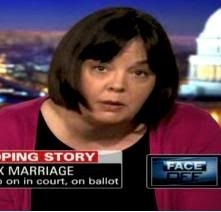 Sunday will be the day that gay couples in New York will be able to legally marry. And naturally the National Organization for Marriage isn't happy about it. The organization has planned protests across the state.
Sunday will be the day that gay couples in New York will be able to legally marry. And naturally the National Organization for Marriage isn't happy about it. The organization has planned protests across the state.Maggie Gallagher, NOM chairwoman, conducted an interview with the American Family Association's One News Now talking about the situation. And if you ask me, based upon what she said, Gallagher is fortunate that lightning didn't strike her during interview:
She (Gallagher) reports that her group is hearing from "voters all over the state ... [who] are really upset, not only about marriage, but about the lying, the deceit, [and] the flip-flopping. It's really a symbol of the corrupt, insider politics which has dominated Albany for years and is now reaching a new height," Gallagher laments.Is Gallagher for real? How can she whines about the "deceit" of the NY legislator while her organization are guilty of the following offenses:
sent out mailers and commercials claiming that gays are using the marriage argument to corrupt children,
unsuccessfully tried to skirt disclosure laws in six states in an attempt to hide its donor list,
cynically played the black and gay communities against one another,
gave misleading testimony during a Congressional hearing on DOMA,
knowingly faked an argument about legal scholars bothered by the NY law for marriage equality, and
is presently teaming up with the Minnesota Family Council to stop marriage equality in the state in spite of the fact that the organization claims that gays engage in bestiality, pedophilia, and the consuming of bodily wastes.
If Gallagher wants to talk about deceit, she should look to the organization she helped to start. If it weren't for deceit and corruption, NOM wouldn't have any victories to speak of.
July 21, 2011
NC: Durham City Council unanimously passes resolution opposing state marriage amendment
The Durham City Council unanimously passed a resolution today opposing a statewide referendum on a constitutional ban on same-sex marriage.The comments so far have been supportive, save the usual "one man, one woman" bleating by one. Chapel Hill and Carrboro are also on the record opposing the amendment.Councilwoman Diane Catotti did not attend the meeting but sent an e-mail supporting the resolution, Councilman Eugene Brown said.
The resolution is intended to send a message to the Republican-controlled legislature that the city opposes a push for a 2012 referendum on an amendment to the constitution that reaffirms a state law banning same-sex marriage. It could possibly invalidate other recognitions of same-sex partnerships, such as the city's domestic partnership benefits and lead to litigation.
Too bad North Carolina's General Assembly is chock full of anti-gay @sshats, and worse, pols who don't really care one way or another but will use gays as a political football to score points with the low-info "Christian" base.
***
NOTE: In 2009, the Durham City Council passed a resolution (again, unanimously) in support of marriage equality. And I covered it live:
Breaking: Pentagon Will Certify An End To A Ban On Gays In Military Tomorrow
From National Public Radio's (NPR's) Pentagon Will Certify An End To A Ban On Gays In Military:
NPR's Rachel Martin reports that tomorrow, the Pentagon will announce Defense Secretary Leon Panetta has signed a certification that states the military is ready to allow gay men and women to serve openly.President Obama will then be allowed to formally end the "don't ask, don't tell" policy that's been in place for almost 18 years.
NPR then quotes the Washington Post's Military leaders to certify end of 'don't ask, don't tell' Friday:
Top Pentagon leaders will say Friday [July 22, 2011] that the military is ready to permit gay men and lesbians to serve openly in the military, allowing President Obama to formally end the "don't ask, don't tell" policy, according to a U.S. official and others familiar with the plans.In accordance with a law passed in December that set in motion the process of ending the ban, Obama first must receive notice from Defense Secretary Leon E. Panetta and top uniformed brass that the military is prepared to end the policy before the government stops enforcing it. The policy will end 60 days after Obama formally certifies the repeal in writing to Congress.
If Obama signs the certification in the coming days, the ban would end in late September.
From the Associated Press's Panetta to OK end of military gay ban:
Pentagon chief Leon Panetta has decided to end the ban on gays serving openly in the armed services and certify that repealing the 17-year-old prohibition will not hurt the military's ability to fight, officials said Thursday.His decision, which was expected, comes two weeks after the chiefs of the military services told Panetta that ending the ban would not affect military readiness. Dismantling the ban fulfills a 2008 campaign promise by President Barack Obama, who helped usher the repeal through Congress and signed it into law late last December.
But the move also drew vehement opposition from some in Congress and initial reluctance from military leaders, who worried that it could cause a backlash and erode troop cohesion on the battlefield.
Defense officials said the announcement will be made Friday afternoon. The officials spoke on condition of anonymity because the decision had not been made public.
And from the Wall Street Journal's Military Gay Ban to End in 60 Days:
Top defense officials plan to announce Friday that the Pentagon is ready to end the ban on gays serving openly in the military, officials said, a landmark moment after almost two decades of controversy.The action means the ban will formally disappear in late September. The next step for the military is to resolve lingering questions, such as what benefits same-sex couples will receive.
Big news, for sure.
Guest column by Tobias Barrington Wolff: DOMA Repeal and the Truth About Full Faith & Credit
 We welcome Tobias Barrington Wolff to the Blend again. He served as the Chair of LGBT Policy for the 2008 presidential campaign of Barack Obama, and is a law professor at the University of Pennsylvania and a civil rights lawyer and advocate. This is a timely essay that covers a lot of the shifting legal ground related to marriage equality and where things stand now.
We welcome Tobias Barrington Wolff to the Blend again. He served as the Chair of LGBT Policy for the 2008 presidential campaign of Barack Obama, and is a law professor at the University of Pennsylvania and a civil rights lawyer and advocate. This is a timely essay that covers a lot of the shifting legal ground related to marriage equality and where things stand now. With the introduction of the Respect for Marriage Act and President Obama's strong endorsement of the legislation, we are closer than ever before to achieving the repeal of the so-called "Defense of Marriage" Act, the discriminatory 1996 statute that denies equal treatment across the board to committed same-sex couples. Predictably, opponents of equal treatment are making the same alarmist claims that succeeded for them so well when they got DOMA enacted fifteen years ago: that the Full Faith and Credit clause of the U.S. Constitution will require that a marriage performed in one state between a same-sex couple automatically be recognized everywhere in the country. According to this claim, states that deny the freedom to marry to same-sex couples will suddenly have their policies overridden by the decisions of Iowa, New York or Massachusetts.These claims are false. They always have been. In fact, it has been well established for more than a century that Full Faith and Credit does not require mandatory recognition of marriages around the country in the same way that it requires mandatory recognition of judgments by courts (which is its core function). Insofar as DOMA was enacted to address a supposed full faith and credit problem, it was enacted on a falsehood. Now that repeal is on the horizon, it is time to put that falsehood to bed.
The key points that it is important to understand are the following:
? First, this is not the first time that states have had different policies on contentious questions about civil marriage and who can get married under state law. Far from it. States have figured out sensible ways to handle these policy differences in the past, and they can do so again.
? Second, while repealing the "full faith and credit" portions of the Defense of Marriage Act is very important for a number of reasons, it will not have the dramatic and far-reaching effect of "imposing" same-sex marriage upon other states, as many on both sides of the debate often assume.
THE FREEDOM TO MARRY IN THE UNITED STATES
Same-sex couples now enjoy the freedom to marry in six states -- Massachusetts, Iowa, New Hampshire, Vermont, Connecticut and New York -- and the District of Columbia, and there is significant movement toward equality through the legislatures, the initiative process and the courts in Maryland, New Jersey, California, and Maine. The powerful trend in America is toward full LGBT equality. But may be many years before same-sex couples enjoy equal treatment throughout the United States. Until that happens, there will be significant differences in state laws relating to civil marriage around the country. Some states will expressly permit same-sex couples to marry (like New York and Iowa), some states will expressly recognize the out-of-state marriages of same-sex couples even if the couples cannot marry locally (like Maryland), and many states will continue to have less sympathetic or even hostile policies toward married couples.
Courts in the United States have been dealing with this type of problem for close to two hundred years. Contrary to many public discussions and news reports, the current disagreements over civil marriage for same-sex couples do not represent the first time that significant differences have arisen between the marriage laws of the various states. Laws relating to interracial marriage (anti-miscegenation laws), marriages between people related by blood (particularly uncles and nieces or first cousins), certain marriages following divorce, and marriages involving teenagers have at times varied enormously in the United States and produced sharp differences of opinion among the states. The basic set of problems that can arise when different states have different policies on civil marriage is an old one, and courts have been working out sensible solutions to those problems for a long time.
More below the fold.
THE "RECOGNITION" OF A CIVIL MARRIAGE
First off, it is important to say a few words about what it means for one state to "recognize" a marriage from another. There are a lot of different situations in which a couple might ask to have their civil marriage recognized under the law. These situations may have very different legal implications.
The strongest claim that a married couple can make to have their marriage "recognized" is when they have a judgment, issued by a court, that entitles them to something -- money from an insurance company on a claim, for example, or a particular custodial arrangement with their kids. Under the principle of full faith and credit, states have always operated under a powerful obligation to give effect to court judgments from other states on almost every subject. This is true even when other states disagree strongly with the law that one court applies in deciding a lawsuit. Thus, if a court resolves a dispute involving a marriage between a particular set of parties in one state, and then another state is asked to give effect to the resulting judgment (for example, by ordering an unwilling party to pay up on a damages award), state number two is not allowed to disregard the judgment simply because it disagrees with the marriage laws from state number one. Where judgments issued by courts are concerned, the obligation for every state to respect the judgments of every other state is a mandatory one and applies almost without exception.
When there aren't any court judgments involved -- which is frequently the case -- the situation is very different. Often, a couple seeking to have their marriage "recognized" is merely interacting with the legal system in some way and wants to be treated as a married couple. If one spouse passes away, the surviving spouse may want to make claims on the estate based upon the fact that they were married, or he might want to have the marriage recognized for purposes of confirming custody over the children. If a state gives favored treatment to married spouses in its tax laws, or in its health, insurance and retirement benefits for public employees, a couple may want to have their marriage recognized for purposes of participating in those programs. Historically, couples sometimes even had to ask that their marriage be recognized as a defense to a criminal prosecution, where a state was going after one or both of them for illegal fornication. (Following the Supreme Court's decision in Lawrence v. Texas, such prosecutions are happily a thing of the past.)
When a couple asks a court to recognize their marriage in this type of situation, the analysis has always been very different. A marriage is not the same thing as a court judgment. The mere act by one state of marrying a couple has never been entitled to the kind of mandatory legal enforcement that judgments receive in our legal system. Rather, courts have always treated the recognition of out-of-state marriages as a matter of public policy, and various factors have influenced the decisions that states have made about recognizing an out-of-state marriage that could not have been entered into locally.
Some states have taken a very liberal view, deciding that, if a marriage was valid and legal in the place where it was celebrated, then it should always be treated as valid and legal. New York has embraced that policy since the nineteenth century, for example.
Other states have used a more case-by-case analysis. For example, suppose that a couple lives in a state where they cannot get married, but there are other states in the country where they could. Suppose that the couple travels to one of those other states, gets married, then returns to their home state to continue living, all with the express purpose of evading the restriction that prevents them from marrying in their home state. In states that use a case-by-case analysis, this kind of "evasive" marriage has been treated less sympathetically.
Finally, all of the various approaches to these marriage questions have generally been qualified by a "public policy" exception. Even if a state court might otherwise be inclined to recognize an out-of-state marriage under whatever rules it applies, most courts have still reserved the right to make an exception if the type of marriage in question would violate their state's strongly held public policies. This public policy exception does not apply to judgments issued by courts. In fact, the Supreme Court has made it clear that even sharp differences in public policy do not give one state the right to escape the obligation to enforce another state's judgments. But the public policy exception has long been invoked by courts in marriage disputes that where prior court judgments are not at stake, like the health insurance examples described above.
In the current discussions about marriage for same-sex couples, a few distinguished commentators have taken the position that the public policy exception should be rejected altogether. Larry Kramer at Stanford has argued that the public policy exception is inconsistent with the principles of full faith and credit. Joseph Singer at Harvard has gone further, arguing that states should always be required to recognize a marriage if that marriage was valid in the place where it was celebrated. Evan Wolfson, the influential lawyer and advocate, has taken a position similar to Joe Singer's. Whether these commentators are right or wrong, this is the minority position. Most scholars and commentators in the field of Conflict of Laws -- the area of law that deals with this kind of dispute across state lines -- agree that states should have the power to decline to give effect to an out-of-state marriage that is inconsistent with local laws, whether because that marriage violates public policy, because it was the result of a couple deliberately evading local marriage laws, or for some other reason.
My own work in this field has focused on the particular reasons that states have given in the past for declining to recognize an out-of-state marriage and the need to revisit some of those reasons in light of recent decisions by the U.S. Supreme Court that have held certain forms of discrimination, criminalization, or moral disapproval to be unconstitutional, particularly with respect to gay people and gay couples. Even if one starts from the assumption that a state can deny same-sex couples the right to marry -- and one has to start from that assumption for purposes of this kind of discussion; otherwise, the couples could get married in their home state and there would be nothing to discuss -- I have argued that, following these recent developments, many of the reasons that states have relied upon in the past for denying effect to a couple's marriage are no longer available, and that a proper analysis should lead many states to give effect to a same-sex couple's marriage as a matter of good public policy, even if they are not mandated to do so by full faith and credit. Those arguments are developed at length in a scholarly article that can be downloaded here.
In Summary:
? When a court in one state issues a judgment in a lawsuit, including a lawsuit that somehow involves a marriage -- an award on an insurance or wrongful death claim, or the resolution of a custody dispute -- full faith and credit has always required other states to give effect to that judgment, almost without exception.
? When there are no court judgments involved, and a couple has simply gotten married and wants another state to recognize that marriage for some reason -- the probate of an estate, or equal participation in a public employer's health, insurance and retirement benefits -- the situation is more complicated. These questions have always been treated as a matter of policy for the states to decide, rather than as a matter of mandatory obligation. Some states have taken a liberal attitude toward such recognition, while others have employed a more case-by-case analysis.
? Historically, states have reserved the right to apply an exception for reasons of public policy when they are asked to recognize an out-of-state marriage, even if their normal rules would otherwise indicate that the marriage should be given effect. But that public policy exception has never been available where judgments by courts are involved.
"MINI DEFENSE OF MARRIAGE ACT" IN THE STATES
Since the 1993 decision of the Hawai'i Supreme Court that placed these issues on the map, many states have enacted statutes or state constitutional amendments that prohibit same-sex couples from marrying. These provisions are often referred to as "mini-DOMAs." When discussing what validity a same-sex couple's marriage will have as they travel around the country, many commentators assume that these mini-DOMA provisions automatically indicate that a state will refuse to recognize an out-of-state marriage, for any purpose. That assumption is not always correct.
As noted above, state courts have long recognized that a state can refuse to recognize an out-of-state marriage when that marriage violates local public policy. But many states have been cautious in applying that exception. In particular, some courts have said that they will not deny effect to a marriage that was validly performed in another state unless their own legislature has made it unmistakably clear that it desires that result. Even where a legislature has spoken in very strong terms about its policy against allowing certain couples to marry inside the state -- for example, by saying that a marriage between first cousins is prohibited and would be considered "absolutely void" -- some courts have found that they should not apply that policy to out-of-state marriages unless the legislature has told them to do so explicitly.
Only about two thirds of the mini-DOMA provisions enacted by states in recent years expressly address the question of out-of-state marriages. In states where the legislature has not addressed out-of-state marriages in their mini-DOMA provisions -- and, of course, in states that have no such provisions at all -- courts retain the option to recognize the marriages of same-sex couples on a case-by-case basis, even if those couples could not marry within the state in the first place.
Still, it is important not to understate the impact of these mini-DOMA provisions. Even at the height of one of our most contentious disputes over marriage laws in the United States -- the fight over interracial marriage -- few states took the view that they would always refuse to recognize an interracial marriage. Even hostile states were open to the possibility, for example, that an interracial couple who legally married in another state where they once lived, and then relocated or travelled to a hostile state, might still be entitled to have their marriage recognized for at least some purposes (like the probate of an estate). In comparison, the level of legal hostility toward the marriages of same-sex couples -- with some states refusing even to recognize the marriage for purposes of allowing the couple to get a divorce when their relationship comes to an end -- has been remarkable. Some of these mini-DOMA provisions lock that legal hostility into the state constitution.
In Summary:
? The mini-DOMA provisions that about forty states have now enacted pose serious obstacles to the recognition of a same-sex couple's marriage, but only about two thirds of those provisions actually make it clear that the recognition of such a marriage from out of state would violate public policy. In the rest of the states (and in those with no mini-DOMA at all), courts have more leeway to make sensible and fair decisions.
THE FEDERAL "DEFENSE OF MARRIAGE" ACT
Onto this complex but fairly stable legal landscape, the federal statute known as the "Defense of Marriage" Act was imposed in 1996. At the time of its enactment, DOMA was sold to the Congress, the President, and the American people as a necessary move to "protect" objecting states from being forced to recognize the marriages of same-sex couples performed in other jurisdictions. This was not true, and never has been. Putting to one side for the moment questions of fairness, sensible policy, and principles of equal protection, it has long been clear that states have the authority to deny recognition to an out-of-state marriage based on a public policy objection. (Once again, although respected scholars like Kramer and Singer, and respected advocates like Evan Wolfson, have argued that the public policy exception should be categorically rejected, those views remain in the minority.) If states are concerned about the prospect that they will be compelled by New York, Massachusetts, or some other state to recognize the marriages of same-sex couples, those concerns have always been misplaced. States did not need the federal Defense of Marriage Act for that. If tomorrow, we were to enact the Respect for Marriage Act and repeal DOMA in its entirety, states would possess the same power that they have always had to refuse to recognize out-of-state marriages on public-policy grounds.
Some commentators, understanding this fact, have turned the argument around, suggesting that repealing the full faith and credit portion of DOMA would not accomplish anything and is unimportant. (DOMA also has a section that prohibits the federal government from extending equal federal benefits to same-sex couples who are married, civilly united or domestically partnered under state law. Everyone acknowledges the significance of repealing that portion of the law.) This view -- that repealing the full faith and credit portion of DOMA would do nothing and is unimportant -- is also wrong. Although the states do have the power to deny recognition to the out-of-state marriages of same-sex couples with or without DOMA, the full faith and credit portions of DOMA harm LGBT people in at least three important ways.
First. The language of DOMA purports to give states the ability to deny recognition not just to the marriages and civil unions of same-sex couples (which states could do anyway), but also to any court judgment "respecting" the marriage or union of a same-sex couple, or respecting a right or claim arising out of that relationship. Recall the important distinction discussed above between a court judgment and a marriage. Unlike the ordinary recognition question, states have a mandatory obligation, subject to very few exceptions, to give effect to judgments rendered by courts in other states around the country. For the first time in the history of the United States, the Defense of Marriage Act takes one class of people -- same-sex couples -- and says that courts may simply disregard judgments rendered by the courts of other states when those judgments are in some way based upon the couple's relationship. So, if an insurance company is ordered to pay a claim on a policy, or a reckless driver is ordered to pay a damages award, or a court issues a ruling on custody or support, DOMA now gives hostile states the unprecedented power to ignore those out-of-state judgments altogether. The potential for harm and disruption that this provision of DOMA inflicts upon the families, the finances, and the stability of same-sex couples is severe.
Most state legislatures have no idea that DOMA gives them this kind of power, and most people certainly did not have this important issue in mind when DOMA was enacted. For example, I testified before the Judiciary Committee of the Pennsylvania Senate several years ago about the possible effects of a mini-DOMA constitutional amendment that they were considering. In my testimony, one of the things I discussed was the impact of the federal DOMA on the enforceability of court judgments. The legislators were astonished. No one had ever explained to them that the federal DOMA gave them such a dangerous power.
Second. DOMA encourages states to avoid any kind of serious analysis when they are presented with a recognition question. While the states have never had a mandatory obligation to recognize the relationship of an out-of-state couple who could not marry locally, some states have nonetheless chosen to extend such recognition as a matter of sensible policy. As the discussion above explains, these are complicated issues. Recognition questions arise in all kinds of different situations. There are many circumstances in which a state might decide that it is good public policy to recognize a couple's marriage, even if the couple would not have been allowed to marry under local state laws. State courts have been using careful analysis to work out sensible answers to these questions for a long time. In enacting DOMA, however, Congress sent a signal to the states that they should not ask questions about what constitutes good and sensible policy when it comes to same-sex couples. Rather, Congress invited the states to give over-simplified answers, exercising a blanket prerogative to reject same-sex relationships for all purposes. DOMA, in other words, validates and encourages the states to treat same-sex couples with legal hostility.
Third. The full faith and credit provisions of DOMA are a gratuitous affront to the dignity of 10,000,000+ LGBT Americans. Never before in the history of the Republic has Congress singled out one class of citizens and proclaimed that their relationships would be treated with hostility in interstate relations. The historical antecedent of interracial marriage is instructive. For the first eighty years of the Republic, people of African descent were enslaved, and they were denied the rights of citizenship under the Dred Scott decision even when they were free. No other group of people in the United States has suffered a similar harm. But once African-Americans were recognized as citizens under the Thirteenth and Fourteenth Amendments, and the issue of interracial marriage arose and became sharply contested, even the long American history of racial animus did not lead Congress to single out interracial relationships for the kind of discriminatory treatment in interstate relations that DOMA affords to same-sex couples. In this important respect, DOMA represents an unprecedented affront.
In Summary:
? The states never needed DOMA in order to refuse recognition to out-of-state marriages between same-sex couples. If they are bound and determined to refuse to give any recognition to those relationships, they already have the power to do that, and repealing DOMA in its entirety will not change that fact.
? Repealing DOMA remains vitally important, however, because the statute places in jeopardy all court judgments that are based upon the existence of a same-sex relationship. Authorizing states to refuse to enforce this one class of out-of-state judgments -- something that has never been done in the history of the United States -- disrupts family and financial relationships and encourages irresponsible behavior.
? DOMA also has the effect of encouraging states to avoid the kind of serious analysis that marriage recognition disputes require. There are many situations in which it makes sense for a state to recognize the relationship of a same-sex couple, even if the state would not allow the couple to marry in the first place. States have an obligation to analyze those situations carefully. DOMA encourages states to treat these couples with hostility, and it represents a particular type of affront to one class of citizens that is unprecedented in federal law.
Gay Barbarians Glitter Storm Bachmann Clinic
I dare you not to laugh.
Gay barbarians stormed the Christian counseling clinic Presidential candidate Michele Bachmann owns with her husband Marcus Bachmann.
Chanting, "You can't pray away the gay - baby, I was born this way!" the group glittered the waiting room, in a attempt to draw attention to discredited "Pray The Gay Away" practices that have gone on there. Also under scrutiny are questions about upwards of $130,000 in Medicaid funding the clinic has received.

The group's press release explains the action:
Today a horde of gay barbarians descended upon Michele and Marcus Bachmann's "pray away the gay" clinic and demanded that Marcus come out and discipline them for their "deviant" behavior.
Marcus Bachmann, who conducts "reparative therapy" at the clinic intended to convert homosexuals, has said that gays are "barbarians who need to be disciplined." The horde requested to speak directly with Bachmann and experience some "discipline" for themselves.
When Marcus was no where to be found, the barbarians glittered the empty waiting room and reception area while chanting, "You can't pray away the gay -- baby, I was born this way!"
The action was organized by the same young man who threw glitter on Newt Gingrich, starting a national trend in political protest of anti-LGBT sentiments from political candidates and campaigns.
"Michele and Marcus Bachmann think gay people are barbarians?" asked LGBT activist Nick Espinosa. "I think its clear to everyone who the real barbarians are, based on the Bachmanns' archaic views on LGBT equality."
A Controversial Past:
Michele Bachmann has a long history of controversial anti-gay politics, and has compared the gay lifestyle to "bondage and slavery." In 2005, she was infamously caught lurking in the bushes during an LGBT rally. That same year, she attempted to file a police report when two constituents -- a lesbian and an ex-nun -- tried to talk with her about marriage equality following a townhall event. The police department refused to file a report, citing that she was in no danger.
Her anti-gay views have been a focal point of her career as a politician, but lately she has shied away from reporters' questions about her controversial comments and taxpayer-funded "reparative therapy" clinic. While Michele Bachmann has long railed against federal safety net programs like Medicaid, the Bachmann & Associates clinic has received over $137,000 in Medicaid funds and over $27,000 in other state and federal funds. [1]
Last week an undercover investigation confirmed that the Bachman's clinic is, to this very day, providing discredited "ex-gay" reparative therapy. [2]
For years the scientific and medical communities, including groups like the American Psychology Association, have dismissed "reparative therapy" (also known as "conversion therapy" or "ex-gay therapy") as dangerous and unethical. [3]
"Its time for Michele Bachmann to stop running away and to take responsibility for her destructive clinic. She, of all people ,should not be abusing medicare and wasting taxpayer dollars to practice quack science that endangers her patients," Espinosa said.
For more information, contact Nick Espinosa: 612-432-8888.
------------
[1] Bachmann's husband got $137,000 in Medicaid funds
[2] I Received 'Ex-Gay' Therapy at Marcus Bachmann's Clinic.
[3] Just the Facts About Sexual Orientation and Youth.
 The progressive online organizing group Credo has a petition posted asking Medicaid funding be stopped for these practices.
The progressive online organizing group Credo has a petition posted asking Medicaid funding be stopped for these practices.The Department of Health and Human Services (HHS), which oversees Medicaid, and the Minnesota Department of Health (DEH), which distributes the funds within the state, should immediately pull public funds from Bachmann's clinic.
*Tell Secretary Sebelius and DEH Commissioner Edward Ehlinger: Stop funding Bachmann's anti-gay clinic.*
Going to the Bachmann family for counseling is like attending a peace rally hosted by Dick Cheney.
Their views are extreme, hateful and crazy. Michele Bachmann has called homosexuality "a part of Satan," and "a real issue of sexual dysfunction" while her husband Marcus has called gays "barbarians."
And even as Michele Bachmann's family was collecting over $160,000 in Medicaid and other public funds, she was leading Tea Party calls for drastic cuts to the social safety net - especially to Medicaid which she has said swell the "welfare rolls" - and even voted to shut down the government rather than continue funding Planned Parenthood and the Health Care Reform Act.3
Pam Spaulding's Blog
- Pam Spaulding's profile
- 1 follower




